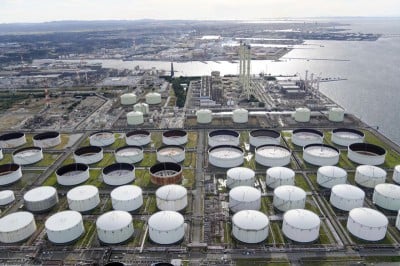advertisement
 © Reuters. FILE PHOTO: An aerial view shows an oil factory of Idemitsu Kosan Co. in Ichihara, east of Tokyo, Japan November 12, 2021, in this photo taken by Kyodo. Mandatory credit Kyodo/via REUTERS/File Photo LCO -0.44% Add to/Remove from Watchlist Add to Watchlist Add Position
© Reuters. FILE PHOTO: An aerial view shows an oil factory of Idemitsu Kosan Co. in Ichihara, east of Tokyo, Japan November 12, 2021, in this photo taken by Kyodo. Mandatory credit Kyodo/via REUTERS/File Photo LCO -0.44% Add to/Remove from Watchlist Add to Watchlist Add Position Position added successfully to:
Position added successfully to:
Position added successfully to:
By Arathy Somasekhar
(Reuters) - Oil prices edged down slightly on Tuesday after gaining more than 4% in the previous session as markets weighed the potential for supply disruptions as the conflict between Israel and the Palestinian Islamist group Hamas continued.
Brent crude fell 18 cents, or 0.2%, to $87.97 a barrel at 0017 GMT, while U.S. West Texas Intermediate crude eased 16 cents or 0.2% to $86.22 a barrel.
Both benchmarks had gained more than $3.50 on Monday on news of the conflict after falling steeply in volatile trading last week.
Hamas' launched the largest military assault on Israel in decades on Saturday. Fighting continued into the night on Monday as Israel retaliated with a wave of air strikes on Gaza.
While Israel produces very little crude oil, markets worried that if the conflict escalates it could hurt Middle East supply and worsen an expected deficit for the rest of the year.
Israel's port of Ashkelon and its oil terminal have been shut in the wake of the conflict, sources said on Monday.
The fighting could also derail U.S. efforts to broker a rapprochement between Saudi Arabia and Israel and any associated increase in output next year as part of the deal.
The turmoil may also cause U.S. to tighten its sanctions on Iran and hurt export of Iranian oil, analysts said.
Iran is complicit even though the United States has no intelligence or evidence that points to Iran's direct participation in the attacks, a White House spokesperson said on Monday.
In a more positive sign for supply, Venezuela and the U.S. have progressed in talks that could provide sanctions relief to Caracas by allowing at least one additional foreign oil firm to take Venezuelan crude oil under some conditions, sources said.
Oil prices dip as markets debate hit from Middle East turmoil